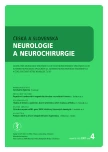Poliomyelitis-like syndrome caused by tick-meningoencephalitis
Authors:
E. Ehler; A. Novotná; M. Mrklovský *
Authors‘ workplace:
Neurologické oddělení Krajské nemocnice Pardubice
; RC, Společnost Multiscan, Krajské nemocnice Pardubice
*
Published in:
Cesk Slov Neurol N 2007; 70/103(4): 420-423
Category:
Case Report
Overview
Tick-born Central European encephalitis may be accompanied by myeloradiculitis symptoms in up to 5% of patients. We report a case of a 48-year old woman, who was at first hospitalized for unspecified meningitis, when all common neuroinfections were excluded – including tick encephalitis – and after improvement she was discharged home. One month later she was admitted at the department of neurology with severe tetraparesis, muscular pain, without sensory deficit. Diagnosis of myelopolyradiculitis with only motor neurons and anterior roots lesion was done according to clinical findings and EMG. MRI findings confirmed our diagnosis and titer antibodies against tick-encephalitis were considerably positive, though the woman was properly vaccinated. Two months later and after supportive medication and intensive rehabilitation the patient began to walk with support.
Key words:
Tick-born Central European encephalitis – myeloradiculitis – motor neuron lesion – EMG
Sources
1. Schellinger PD, Schmutzhard E, Fiebach JB et al. Poliomyelitic-like illness in central European encephalitis. Neurology 2000;55 : 299–302.
2. Doutlík S. Encefalitida klíšťová evropská. In: Horký K. Lékařské repetitorium. Praha: Galén 2003 : 133–134.
3. Pongratz D, Spatz R. Infektiös-entzündliche Erkrankungen. In: Bernsmeier A, Schrader A, Struppler A.(eds) Differentialdiagnose neurologischer Krankheitsbilder. Stuttgard-New York: Georg Thieme Verlag 1984 : 3.1–3.39.
4. Logina I, Krumina A, Karelis G et al. Clinical features of double infection with tick-borne encephalitis and Lyme borreliosis transmitted by tick bite. JNNP 2006; 77 : 1350–1353.
5. Marx A, Glass JD, Sutter RW. Differential diagnosis of acute flaccid paralysis and its role in poliomyelitis surveillance. Epidem Rev 2000; 22 : 298–316.
6. http://www.neuro.wustl.edu/neuromuscular
7. Oh SJ. Principles of clinical electromyography. Case studies. Baltimore: Williams&Wilkins 1998.
8. Gorson KC, Ropper AH. Nonpoliovirus poliomyelitis simulating Guillain-Barré syndrome. Arch Neurol 2001;58 : 1460–1464.
9. Rendi-Wagner P, Kundi M, Zent O et al. Persistence of protective immunity following vaccination against tick-borne encephalitis – longer than expected? Vaccine 2004; 22 : 2743–2749.
10. Kollmeier M, Hagemann G, Kunze A et al. Differenzialdiagnostische Hürden bei der FSME-induzierten Polyradikulitis. Der Nervenarzt 2002; 73 : 1191–1194.
11. Beer S, Brune N, Kesselring J. Detection of anterior horn lesions by MRI in central European tick-borne encephalomyelitis. J Neurol 1999; 246 : 1169–1171.
Labels
Paediatric neurology Neurosurgery NeurologyArticle was published in
Czech and Slovak Neurology and Neurosurgery

2007 Issue 4
- Memantine Eases Daily Life for Patients and Caregivers
- Possibilities of Using Metamizole in the Treatment of Acute Primary Headaches
- Metamizole at a Glance and in Practice – Effective Non-Opioid Analgesic for All Ages
- Memantine in Dementia Therapy – Current Findings and Possible Future Applications
- Advances in the Treatment of Myasthenia Gravis on the Horizon
-
All articles in this issue
- Muscular biopsy in myotonic dystrophy in the era of molecular genetics
- Surgical treatment of hormonally active hypophysial adenomas
- Regulation of mRNA expression of the SMN2 gene by histone deacetylase inhibitors and their influence on the phenotype of type I and II spinal muscular atrophy
- Poliomyelitis-like syndrome caused by tick-meningoencephalitis
- Thrombosis of the sigmoid sinus – current views on diagnosing and treatment
- The treatment of sleep apnea in young children using bilevel positive airway pressure
- Swallowing difficulties in diffuse idiopathic skeletal hyperostosis
- Cervical dystonia
- Repetitive transcranial magnetic stimulation and chronic subjective tinnitus
- Levels of D-dimers in patients with acute ischaemic stroke
- Changes in congintive functions in patients with acute cerebrovascular event who tested by Mini-Mental State Examination and the Clock Drawing Test
- Decompressive craniectomy as treatment for a rat model of „malignant“ middle cerebral artery infarction
- Correlation of the IgG index and oligoclonal bands in the CSF of patients with multiple sclerosis
- Analysis of 1775 Patients Treated by Percutaneous Radiofrequency Rhizotomy for Trigeminal Neuralgia
- Czech and Slovak Neurology and Neurosurgery
- Journal archive
- Current issue
- About the journal
Most read in this issue
- Cervical dystonia
- Levels of D-dimers in patients with acute ischaemic stroke
- Thrombosis of the sigmoid sinus – current views on diagnosing and treatment
- Repetitive transcranial magnetic stimulation and chronic subjective tinnitus
